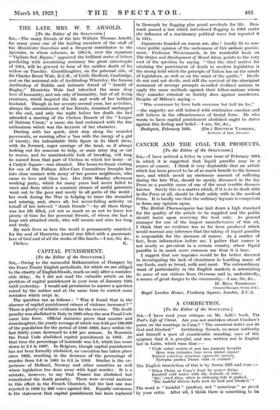CAPITAL PUNISHMENT.
[To the Editor of the SPECTATOR.] Sin,—Owing to the successful Balkanization of Hungary by the Peace Treaty English periodicals, for which we are obliged to the charity of English friends, reach us only after a consider- able delay. So I did not read the valuable article on the problem of capital punishment in your issue of January 13th until yesterday. I would ask permission to answer a question raised by the author and at the same time to correct some mistakes which crept in.
The question ran as follows : "Was it found that in the absence of capital punishment crimes of violence increased ? " There is plenty of reliable evidence for the reverse. The death penalty was abolished in Italy in 1890 when the new Penal Code came into force. Official statistics prove that murder and manslaughter, the yearly average of which was 9.68 per 100,000 of the population for the period of 1880-1889, have within the last thirty years decreased to 4.86 per annum. In Rumania the Penal Code abolished capital punishment in 1865. At that time the percentage of homicide was 5.6, which has come down to 2.5 in 1907. In Belgium, though capital punishment has not been formally abolished, no execution has taken place since 1863, resulting in the decrease of the percentage of murder from 0.6 in 1861 to 0.2 in 1910. Similar is the ex- perience of Holland, Norway and other countries as well where legislation has done away with legal murder. It is a mistake, however, to say that France has abolished but reinstituted the death penalty. There were several motions to this effect in the French Chamber, but the last one was rejected in 1908 by 800 votes against 201. Equally erroneous Is the statement that capital punishment has been replaced in Denmark by flogging plus penal servitude for life. Den- mark passed a law which introduced flogging in 1905 under the influence of a reactionary political wave but repealed it in 1911.
Arguments founded on reason are, alas ! hardly fit to con- vince public opinion of the uselessness of this- arehaic punish- ment. Professor Westcrmarck, in his wonderful book on The Origin and Development of Moral Ideas, points to the very root of the question by saying "that the chief motive for retaining the punishment of death in modern legislation is the strong hold which the principle of Talion has on the minds of legislators, as well as on the mind of the public." Devils do not cast out devils, and still the survival of the aboriginal sentiment of revenge prompts so-called civilized nations to apply the same methods against their fellow-nations whom they consider criminal as Society does against murderers. Despite of Milton's saying- " Who overcomes by force bath overcome but half his foe,"
—the majority are still imbued with retributive emotion and still believe in the efficaciousness of brutal force. He who wants to have capital punishment abolished ought to strive against this feeling and belief.—! am, Sir, &e., Professor of Law, Advocate.










































 Previous page
Previous page